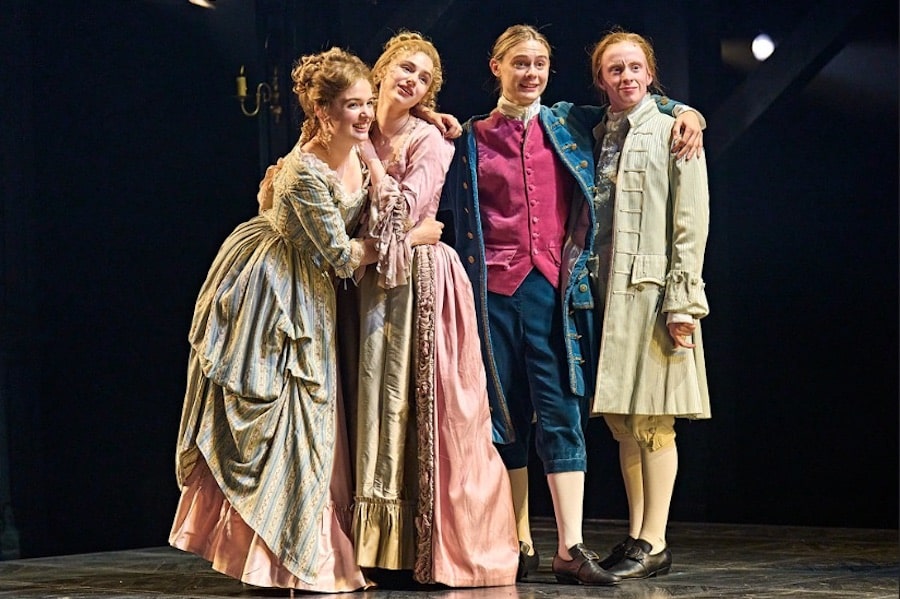Review: Coram Boy at The Lowry is ‘an ambitious production tackling a wide-range of subjects’
- Written by Connor Cooper
- Last updated 10 months ago
- City of Manchester, Theatre

For most people, the mention of 18th Century England conjures up images of aristocracy and enlightened thinking, workhouses and the Industrial Revolution.
The beginning of life as we know it today.
But rarely, do people think about the ugly truth and the true price of survival?
Based on Jamila Gavin’s novel of the same name, and directed by Anna Ledwich, Coram Boy aims to expose the gritty underbelly of Georgian England.
Coram Boy at The Lowry
At the centre of this story, are the exceedingly wealthy and noble Ashbrook family.
Eldest son and heir to the fortune Alexander Ashbrook is away from home studying music, much to the chagrin of his father.
He meets Thomas Ledbury, a similarly skilled musician who is studying thanks to a scholarship. When the two return to Ashbrook House for Easter, their lives will change forever.
Otis Gardener exists in the shadows and he makes a living anyway he can.
Most notably, he is the Coram man. He takes babies from their desperate mothers and, for a fee, delivers them to the infamous Coram hospital, where they will grow up safe, happy and protected from poverty.
Two worlds collide
These two worlds collide as dark secrets are revealed and harsh truths demand to be confronted.
Coram Boy is truly held up by the strength of its actors, who, on the whole, give strong performances.
Louisa Binder doubles as young Alexander Ashbrooke and Aaron Dangerfield.
Binder’s vocals are a standout highlight of the whole production. Her talent makes it is easy to believe that Alexander is a musical prodigy as she sings beautifully and with ease.
Rebecca Hayes, who plays the role of young Thomas Ledbury, provides much needed comic relief that helps to break up the tedium of the first act.
Samuel Oatley showcases ‘impressive range’
Samuel Oatley displays impressive range in his portrayal Otis Gardener, the cruel, deceitful con man as well as the equally odious Lord Philip Gaddarn.
Coram Boy has a lot of children in the ensemble cast so the choice to have adults play the roles of children and teenagers is an odd one.
It feels unnecessary and does not particularly add anything to the show.
Simon Higlett’s set (built by Deadline TML) evokes both the opulence and the squalor of Georgian England, depending on the scene. It provides an eerie and atmospheric backdrop for the play itself and is easily transformed with effective dressing and props.
How is Coram Boy’s pacing?
In terms of pacing, Coram Boy is a tale of two extremes.
During act one, the story reveals itself gradually. Characters and storylines weave together so slowly, it unfortunately feels like slogging through a particularly dense period drama.
Here it is most clear that this is an adaptation of a novel; a scene will end and you can practically see a new chapter of the novel beginning.
I wish that the first act in particular was made more succinct. You are given so much unnecessary exposition, it drags the rest of the show down.
Things pick up considerably in the second act, though it is not always for the better.
Events occur at such a breakneck speed that key moments are often lost in the chaos.
This means that the last ninety minutes of Coram Boy feel less like a cohesive story, with satisfying character arcs and plot progression, and more like an extremely incoherent fever dream on fast forward.
Emma Champman’s excellent lighting design
The lighting design (by Emma Chapman) is beautiful and really helps to distinguish between settings.
It conjures the lavish candelabras of ballrooms and the dankness of deck prisms on a slaver ship easily.
Although it is only mentioned in passing, I would love if the lighting design reflected Alex’s Synestathia.
Perhaps the colours he mentions seeing when he plays certain notes could have been incorporated in some way.
This may help the audience build a connection with Alex, as well as emphasising his alleged all consuming love of music.
Beautiful costumes
Designed by Emily Kingston Lee and Academy Costumes, the costumes in Coram Boy are beautiful.
They fit with what we know of 18th century fashion and further illustrate the ever present class divide.
Coram Boy is a story about music, it is not, however, a musical.
Snatches of songs appear throughout the story but it is hard to see exactly what they add.
With musical direction by Stephen Higgins, each song and piece of music is played very well.
However I’m not sure they serve the story as well as they could.
Perhaps Alex and Melissa (Rhianna Dorris) could have shared a romantic duet? Or Otis Gardener could have had an epic villain anthem?
This may help to break up some of the slower parts and stress the importance of music as a theme throughout the story.
Coram Boy is an ambitious production that attempts to tackle many worthy topics, viewing them through a unique lens.
While this is a worthwhile goal, I am not sure if a play is the best medium for this story.
If you love a sweeping historical period drama, filled with complicated family dynamics and a twisting plot, Coram Boy may be just what you’re looking for!
Coram Boy is at The Lowry until Saturday 29th June 2024. Tickets can be purchased here
- This article was last updated 10 months ago.
- It was first published on 24 June 2024 and is subject to be updated from time to time. Please refresh or return to see the latest version.
Did we miss something? Let us know: press@ilovemanchester.com
Want to be the first to receive all the latest news stories, what’s on and events from the heart of Manchester? Sign up here.
Manchester is a successful city, but many people suffer. I Love Manchester helps raise awareness and funds to help improve the lives and prospects of people across Greater Manchester – and we can’t do it without your help. So please support us with what you can so we can continue to spread the love. Thank you in advance!
An email you’ll love. Subscribe to our newsletter to get the latest news stories delivered direct to your inbox.
Got a story worth sharing?
What’s the story? We are all ears when it comes to positive news and inspiring stories. You can send story ideas to press@ilovemanchester.com
While we can’t guarantee to publish everything, we will always consider any enquiry or idea that promotes:
- Independent new openings
- Human interest
- Not-for-profit organisations
- Community Interest Companies (CiCs) and projects
- Charities and charitable initiatives
- Affordability and offers saving people over 20%
For anything else, don’t hesitate to get in touch with us about advertorials (from £350+VAT) and advertising opportunities: advertise@ilovemanchester.com


The Manc aerobics queen who trained the Corrie cast is helping raise charity cash

Ancoats to get even cooler as independent market set for MOT garage site

“Manchester is not Britain’s second city, it’s the first” – Jeremy Clarkson
















